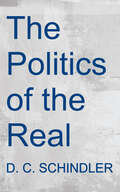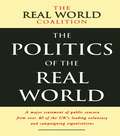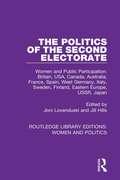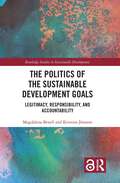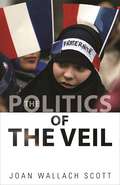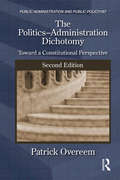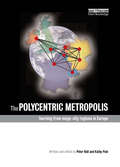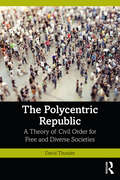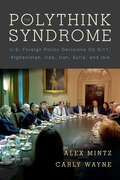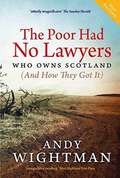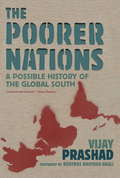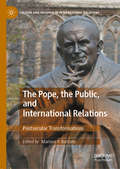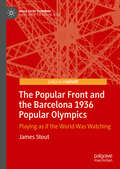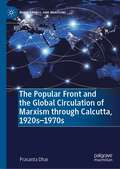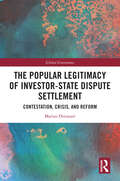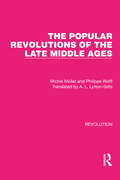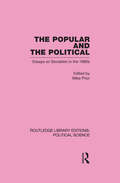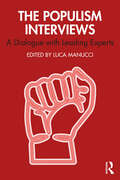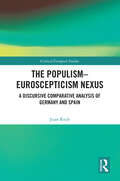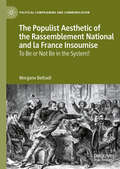- Table View
- List View
The Politics of the Real
by D. C. SchindlerLiberalism is on the defensive. The past few years have seen the emergence of various “postliberalisms” and even a resurgence of Catholic “integralism.” The notion that liberalism and justice, let alone liberalism and Catholicism, are compatible has finally lost its credibility—even lip service to it is no longer required. The postliberal discussion is shifting from “what’s wrong with liberalism” to “what’s true about politics”—to the question of what exactly must displace liberalism. But the answer to this question must not be another (essentially liberal) policy prescription. Liberalism’s vision of the world must be replaced by another one, a broader one that can explain liberalism but cannot be explained by it. In The Politics of the Real, D. C. Schindler squares up to this daunting task, shifting the discussion to its definitive metaphysical the modern reversal of the priority of act over potency; the modern privileging of empty possibility over flourishing perfection. This reversal is the root of modern error—and re-prioritizing act is the basis for the alternative.
The Politics of the Real World: A Major Statement of Public Concern from over 40 of the UK's Leading Voluntary and Campaigning Organisations
by Real World CoalitionMany people today feel that something has gone wrong with British society and British politics. The quality of like seems to be declining. Crime soars. Traffic and pollution spiral. Mass unemployment is undiminished, while many people experience insecurity and stress at work. Growing poverty and inequality have left many of Britain's citizens excluded from mainstream society. Everywhere, the sense of community seems to be breaking down. In the world as a whole, poverty and conflict cause immense suffering and threaten the security of nations. Global environmental degradation - from the greenhouse effect to the destruction of rainforests - makes the very future of the planet uncertain. Yet the political system seems barely to register what is happening. It is hardly surprising that public disillusionment with politicians and Parliament has never been higher. The Politics of the Real World addresses these interlocking crises. Setting out the issues clearly, it explains how conventional economic and social policies are creating the problems we face, not solving them. Arguing that the British political system itself needs rejuvenating, it proposes a new direction for the UK in an increasingly globalised world.
The Politics of the Rule of Law in the EU Polity: Actors, Tools and Challenges (Palgrave Studies in European Union Politics)
by Ramona ComanThis book analyses the challenges facing the European Union through the frame of the rule of law. It shows how over the last decades the increased dissensus and contestation of the rule of law has given rise to heightened tensions between national and EU institutions, leading to the establishment of new soft and hard policy tools to safeguard it at the supranational level. The book proposes a comprehensive and multifaceted analysis of the current state of debates by exploring how EU institutional actors seek to uphold the Union’s values. It shows that European integration in core state powers is the outcome of the clash between liberal and anti-liberal ideas, between dissensus and contestation over how collective problems should be solved, in a community of voices featuring assent and dissent, all of which give democracy its substance. Beyond the analysis of the emerging EU’s rule of law policy, the book will help readers to better understand the EU’s fragilities and resilience and the potential challenges for the future of EU integration.
The Politics of the Second Electorate: Women and Public Participation: Britain, USA, Canada, Australia, France, Spain, West Germany, Italy, Sweden, Finland, Eastern Europe, USSR, Japan (Routledge Library Editions: Women and Politics)
by Joni Lovenduski and Jill HillsPrior to publication there had been little study of the political role of women. Gender had been seen only as a background variable in social surveys of political behaviour, and women had rarely been extensively or separately considered. Now, in essays specially written for this volume, first published in 1981, the authors map out the political behaviour of women in twenty ‘industrially developed’ countries, bringing together and analysing contemporary material on a variety of topics, such as voting, standing for public office, entering the political elite, and engaging in political activity outside the formal structures of government. In each chapter the history of women’s political activity is outlined, from the first movements for female suffrage and emancipation to the new political involvement occasioned by the women’s movements of the 1970s. The impact of differing political systems on the experience of women is considered, and some striking similarities and differences are pointed out. It has been generally agreed that women’s participation in politics has been less than that of men, although reasons postulated for this have varied widely. The essays in this book offer further suggestions in this area, while charting a steady increase in activity by women in all political spheres as feminism politicises issues previously restricted to private or male-dominated spheres and women become increasingly concerned to participate in the political process. The authors indicate current trends and explode prevailing myths and the ‘second electorate’, and they suggest future possibilities, both for Political Woman and the Political Science which must take account of feminist political activity. Students of social and political science, readers seeking comprehensive, cross-national coverage of party and election data, and all interested women will find the book to be a mine of information and a rare and readable picture of half the world’s electorate.
The Politics of the Sustainable Development Goals: Legitimacy, Responsibility, and Accountability (Routledge Studies in Sustainable Development)
by Magdalena Bexell Kristina JönssonThis book draws attention to political aspects of sustainable development goal-setting, exploring the Sustainable Development Goals (SDGs) at the global-national nexus during their first five years. After broad global deliberation and political negotiations, the 2030 Agenda and its SDGs were adopted in the United Nations (UN) General Assembly in 2015, and by now many countries have political structures in place for working towards their realisation. This book explores three concepts to call attention to the political qualities of processes related to the SDGs: legitimacy, responsibility, and accountability. Legitimacy is required to obtain broad political ownership for policy goals in order for them to become effective in addressing cross-border sustainability challenges. Responsibility needs to be clearly distributed among political institutions if a long-term set of broad goals such as the SDGs are to be realised. Accountability to the public is the retrospective mirror of political responsibility. The Politics of the Sustainable Development Goals contributes new knowledge on political processes at the nexus of global and national levels, focussing on three countries at different levels of socio-economic development and democratisation: namely Ghana, Tanzania, and Sweden. These countries illustrate a variety of challenges related to the realisation of the SDGs. This book will be of great interest to students and scholars of sustainable development, international organisations, and global politics.
The Politics of the Veil (The Public Square #7)
by Joan Wallach ScottIn 2004, the French government instituted a ban on the wearing of "conspicuous signs" of religious affiliation in public schools. Though the ban applies to everyone, it is aimed at Muslim girls wearing headscarves. Proponents of the law insist it upholds France's values of secular liberalism and regard the headscarf as symbolic of Islam's resistance to modernity. The Politics of the Veil is an explosive refutation of this view, one that bears important implications for us all. Joan Wallach Scott, the renowned pioneer of gender studies, argues that the law is symptomatic of France's failure to integrate its former colonial subjects as full citizens. She examines the long history of racism behind the law as well as the ideological barriers thrown up against Muslim assimilation. She emphasizes the conflicting approaches to sexuality that lie at the heart of the debate--how French supporters of the ban view sexual openness as the standard for normalcy, emancipation, and individuality, and the sexual modesty implicit in the headscarf as proof that Muslims can never become fully French. Scott maintains that the law, far from reconciling religious and ethnic differences, only exacerbates them. She shows how the insistence on homogeneity is no longer feasible for France--or the West in general--and how it creates the very "clash of civilizations" said to be at the root of these tensions. The Politics of the Veil calls for a new vision of community where common ground is found amid our differences, and where the embracing of diversity--not its suppression--is recognized as the best path to social harmony.
The Politics of the Yorkshire Miners (Routledge Revivals)
by Andrew TaylorFirst published in 1984, The Politics of the Yorkshire Miners examines all aspects of political activity of the Yorkshire Area of the NUM. The book was written using original research from the archives of the Yorkshire Area combined with the author’s personal experience. It explores developments from 1945 onwards, and looks at internal politics within the Area, discussing the nature of policies on both industrial bargaining and wider political aims. It considers the role of sponsored MPs and their relationship to the Area, as well as the NUM’s ‘special relationship’ with the Labour Party. The structure of the Area and its role within the NUM nationally are also discussed, and detailed analysis is given to the strikes of 1972 and 1974.
The Politics-Administration Dichotomy: Toward a Constitutional Perspective, Second Edition (Public Administration and Public Policy)
by Patrick OvereemThe politics-administration dichotomy is much mentioned and often criticized in the Public Administration literature. The Politics-Administration Dichotomy: Toward a Constitutional Perspective, Second Edition offers a book-length treatment of this classical notion. While public administration academics typically reject it as an outdated and even dangerous idea, it re-emerges implicitly in their analyses. This book tells the story of how this has happened and suggests a way to get out of the quandary. It analyzes the dichotomy position in terms of content, purpose, and relevance.What’s in the Second Edition Extensive study of the politics-administration dichotomy as a classic idea in Public Administration A much-overlooked constitutionalist line of argument in defense of this widely discredited notion Exploration and further development of the intellectual legacy of Dwight Waldo Coverage of the dichotomy’s conceptual origins in 18th and 19th century Continental-European thought An assessment of main criticisms against and alternatives for the dichotomy presented in the literature Contributions to the newly emerging Constitutional School in the study of public administration An argument against the institutional separation of Political Science and Public Administration in academia Completely revised and updated, the book examines the idea that politics and public administration should be separated in our theories and practices of government. A combination of history of ideas and theoretical analysis, it reconstructs the dichotomy’s conceptual origins and classical understandings and gives an assessment of the main criticisms raised against it and the chief alternatives suggested for it. Arguing that one-sided interpretations have led to the dichotomy’s widespread but wrongful dismissal, the study shows how it can be recovered as a meaningful idea when understood as a constitutional principle. This study helps readers make sense of highly confused debates and challenge the issues with an original and provocative stance.
The Politics: Introduction To The Politics
by AristotleTwenty-three centuries after its compilation, 'The Politics' still has much to contribute to this central question of political science. Aristotle's thorough and carefully argued analysis is based on a study of over 150 city constitutions, covering a huge range of political issues in order to establish which types of constitution are best - both ideally and in particular circumstances - and how they may be maintained. Aristotle's opinions form an essential background to the thinking of philosophers such as Thomas Aquinas, Machiavelli and Jean Bodin and both his premises and arguments raise questions that are as relevant to modern society as they were to the ancient world.
The Polk Conspiracy: Murder and Cover-Up in the Case of CBS News Correspondent George Polk (Forbidden Bookshelf #9)
by Kati MartonIn war-torn Greece, the murder of a young American reporter sent a shock through the West and set the stage for the four-decade Cold War; now with a new introduction by the author Greece in 1948 was a country reeling from two major conflicts. The Nazi occupation and World War II had left it weakened, and the Greek Civil War—already raging for two years—had torn it apart. One of the earliest clashes of the Cold War, Greece&’s civil dispute pitted the American-backed royalist government against the Soviet-funded Greek Communist Party. Reporting at the front lines for CBS News, George Polk drew the ire of both sides with his uncompromising and incisive coverage. In mid-May, days after going missing, Polk was found dead, shot execution style with his hands and feet bound. What transpired next was a mad scramble of finger pointing and international outrage. To appease its American backers, the Greek government quickly secured the dubious confession of a Communist journalist—though the bulk of the evidence pointed to the royalists. An influential moment in the early days of the Cold War and a powerful force in the formation of the Truman Doctrine, the Polk conspiracy was emblematic of the ideological conflict that would embroil the globe for the next forty years.
The Polycentric Metropolis: Learning from Mega-City Regions in Europe
by Peter Hall Kathy PainA new 21st century urban phenomenon is emerging: the networked polycentric mega-city region. Developed around one or more cities of global status, it is characterized by a cluster of cities and towns, physically separate but intensively networked in a complex spatial division of labour. This book describes and analyses eight such regions in North West Europe. For the first time, this work shows how businesses interrelate and communicate in geographical space - within each region, between them, and with the wider world. It goes on to demonstrate the profound consequences for spatial planning and regional development in Europe - and, by implication, other similar urban regions of the world. The Polycentric Metropolis introduces the concept of a mega-city region, analyses its characteristics, examines the issues surrounding regional identities, and discusses policy ramifications and outcomes for infrastructure, transport systems and regulation. Packed with high quality maps, case study data and written in a clear style by highly experienced authors, this will be an insightful and significant analysis suitable for professionals in urban planning and policy, environmental consultancies, business and investment communities, technical libraries, and students in urban studies, geography, economics and town/spatial planning.
The Polycentric Republic: A Theory of Civil Order for Free and Diverse Societies
by David ThunderThe Polycentric Republic presents a compelling and innovative critique of modern social contract theory. It reveals how the social contract theory systematically neglects the interests and prerogatives of non-State associations and legitimates an imposing sovereign State that jeopardizes the freedom and integrity of communities and associations under its rule.Drawing on neo-Aristotelian virtue ethics, institutional theory, and political history, the author invites us to reimagine civil order in a way that is more friendly to the diverse interests and prerogatives of non-State communities and organizations, from churches, schools, and universities to farming co-ops, businesses, villages, and towns. Building on MacIntyre’s diagnosis of the moral and institutional failures of the modern State, this book offers a historically informed and institutionally rigorous critique of the pathologies of sovereign power. In addition, it proposes a novel reinterpretation of federalism as a complex, emergent order created through bottom-up, inter-group cooperation constrained by the rule of law but consistent with a wide variety of independent communities and ways of life.The Polycentric Republic is essential reading for anyone interested in rethinking State-centric approaches to governance and civil order and exploring the merits of non-Statist, pluralist approaches, be they citizens, policymakers, or students of political science, political philosophy, law, or political economy.
The Polythink Syndrome: U.S. Foreign Policy Decisions on 9/11, Afghanistan, Iraq, Iran, Syria, and ISIS
by Alex Mintz Alex Mintzf Carly WayneWhy do presidents and their advisors often make sub-optimal decisions on military intervention, escalation, de-escalation, and termination of conflicts? The leading concept of group dynamics, groupthink, offers one explanation: policy-making groups make sub-optimal decisions due to their desire for conformity and uniformity over dissent, leading to a failure to consider other relevant possibilities. But presidential advisory groups are often fragmented and divisive. This book therefore scrutinizes polythink, a group decision-making dynamic whereby different members in a decision-making unit espouse a plurality of opinions and divergent policy prescriptions, resulting in a disjointed decision-making process or even decision paralysis. The book analyzes eleven national security decisions, including the national security policy designed prior to the terrorist attacks of 9/11, the decisions to enter into and withdraw from Afghanistan and Iraq, the 2007 "surge" decision, the crisis over the Iranian nuclear program, the UN Security Council decision on the Syrian Civil War, the faltering Kerry Peace Process in the Middle East, and the U.S. decision on military operations against ISIS. Based on the analysis of these case studies, the authors address implications of the polythink phenomenon, including prescriptions for avoiding and/or overcoming it, and develop strategies and tools for what they call Productive Polythink. The authors also show the applicability of polythink to business, industry, and everyday decisions.
The Poor Had No Lawyers: Who Owns Scotland (and How They Got It)
by Andy WightmanIn this updated edition of his &“utterly magnificent&” social history, the Scottish parliamentarian examines the privatization of Scotland&’s common land (Sunday Herald, UK). As an author, activist, and politician, Andy Wightman has made a career of fighting for Scottish land reform. In this provocative and influential book, Wightman offers a revealing analysis of how and why landowners got their hands on the millions of acres that were once held in common. He also tells the untold story of how the Scottish legal and political establishment appropriated land through legal fixes. Throughout, Wightman poses some provocative questions: Have attempts to redistribute power made any difference? What are the implications of the debt-fueled housing bubble, the Smith Commission, and the new Scottish Government's proposals on land reform? Can we get our common good land back? For all those with an interest in urban and rural land in Scotland, this edition of The Poor Had No Lawyers, updated with new statistics, provides a fascinating analysis of one the most important political questions in Scotland.
The Poorer Nations
by Vijay PrashadIn The Darker Nations, Vijay Prashad provided an intellectual history of the Third World and told the story of the rise and fall of the Non-Aligned Movement.With The Poorer Nations, Prashad takes up the story where he left it. Since the '70s, the countries of the Global South have struggled to express themselves politically. Prashad analyzes the failures of neoliberalism, as well as the rise of the BRIC countries, the Group of 12, the World Social Forum, the Latin American revolutionary revival--in short, all the efforts to create alternatives to the neoliberal project advanced militarily by the US and its allies, among whom number the IMF, the World Bank, the WTO, and other economic instruments of the powerful.A true global history, The Poorer Nations is informed by interviews with leading players such as senior UN officials, as well as Prashad's pioneering research into archives of the Julius Nyerere-led South Commission.
The Pope, the Public, and International Relations: Postsecular Transformations (Culture and Religion in International Relations)
by Mariano P. BarbatoThis edited volume engages a long-standing religious power, the Holy See, to discuss the impact of the structural and postsecular transformations of international relations through the emergence of a global and digital public sphere. Despite the legal construction that enables the separation of the Holy See as a distinct legal entity, it is also an instrument for the papacy to represent externally and regulate internally the global and transnational Catholic Church. The Holy See is also the tool that enables the papacy to address a transnational or a global public beyond Catholic adherence – most prominently through journeys that are often at the same time state visits and pastoral journeys. Instead of understanding these hybrid roles as an irregular exemption, the contributions of the book argue that the Holy See should be seen as a certainly special but nevertheless quite normal actor of international and public diplomacy.
The Popular Front and the Barcelona 1936 Popular Olympics: Playing as if the World Was Watching (Mega Event Planning)
by James StoutThis book deals with the events leading up to the 1936 Popular Olympics which would have united the Popular Front in opposition to the Berlin Olympics. It also discusses the days after the outbreak of the Spanish Civil War which began on the same day the games were due to start. Using a variety of primary and secondary sources, the book traces the biographies of several Popular Olympians who would go on to volunteer in the Spanish Civil War. The book also examines the planned events and locations for the Popular Olympics as well as the international funding that the games secured. The book argues that the events were a departure from Workers’ Sport as well as the IOC’s Olympic games and represented an important cultural manifestation of the Popular Front.
The Popular Front and the Global Circulation of Marxism through Calcutta, 1920s-1970s (Marx, Engels, and Marxisms)
by Prasanta DharThis book examines the global circulation of Marxism seen from one of its most highly charged sites: Calcutta in India. Building on but also revising existing approaches to global intellectual history, the book presents the circulation of Marxism through Calcutta as a historically-sited problem of mass mediation. Using tools from media studies, the book explores the way that Marxism was presented to the public, the technologies used, and the meanings of Marxism in twentieth-century Calcutta. Demonstrating how the Popular Front was split between the so-called 'people's group' and those whom were called 'intellectuals', the book argues that the people's group generally identified themselves as Marxists and preferred audio-visual media such as theatre, while the so-called intellectuals privileged academic rigour and print media, usually referring to themselves as Marxians. Thus, the author reveals a polyphony of Marxisms in the Popular Front. Tracing Marxism back to the Bengal Renaissance and the Swadeshi and Naxal movements, this book shows how debate around the meaning of 'Marxism' continued throughout the 1970s in Calcutta, and eventually engendered the historiographical movement that has come to be known as Subaltern Studies.
The Popular Legitimacy of Investor-State Dispute Settlement: Contestation, Crisis, and Reform (Global Governance)
by Marius DotzauerThis book offers theoretical arguments and original empirical data on the legitimacy of the investor-state dispute settlement system in the eyes of the general public. The legitimacy of the investor-state dispute settlement (ISDS) system has become a major issue in recent negotiations on new trade and investment agreements, such as the Transatlantic Trade and Investment Partnership (TTIP), the Comprehensive Economic and Trade Agreement (CETA), and the Trans-Pacific Partnership Agreement (TPP). This book considers the remarkable rise of investor-state arbitration, its politicization and the corresponding legitimacy crisis that has induced a political process of ISDS reform. The book applies theoretical arguments about legitimacy perceptions among the mass public and tests these arguments in survey experiments in Germany, France, and the United States to answer the question of whether ISDS reform can be successful. By showing that large parts of the population hold negative perceptions about the current system of private arbitration and believe that an international investment court and domestic courts are more legitimate dispute resolution systems, the book extends the debate on the legitimacy of the ISDS mechanism, which has so far been dominated by conflicting normative claims of supporters and critics. With regard to the academic debate about legitimacy in global governance, the author underlines that the legitimacy perceptions of ordinary citizens must be taken seriously to ensure the sustainability of global governance and international law in the long term. This book will be of interest to academics working in international relations, international political economy, international law, transnational law, authority, politicization, and legitimacy of global governance. It will also be of great use to practitioners in the field of international investment law, including lawyers, and government officials working in international dispute settlement.
The Popular Revolutions of the Late Middle Ages (Routledge Library Editions: Revolution #22)
by Michel Mollat Philippe WolffThis book, first published in 1973, examines the period when wars, famines and epidemics bred widespread conflicts, culminating in the revolutionary years of 1378–82 with the Florentine ‘Ciompi’, revolts in Flanders and France and the risings among English labourers. The analysis ends with the Hussite crisis which gave the movement a new aspect. The troubles were varied, with hunger riots in cities and brigandage in the country, open struggles between lords and peasants, urban conflicts over municipal power, and labour conflicts over pay and hours.
The Popular and the Political: Essays On Socialism In The 1980's (Routledge Library Editions: Political Science #43)
by Michael PriorThe failure of the left in Britain to achieve its objectives in the past, and the rapidly changing nature of popular involvement in politics in recent years, both suggest the need for a reappraisal of socialist strategy in the 1980s. The Popular and the Political explores the need to redefine socialism in terms which extend beyond 'statism', which has been the mark of both the social democracy of the last two Labour government and the Marxist left, and which reflect the changing nature of contemporary Britain. The essays presented here consider social policy in a wide range of fields, health, housing, energy and economic planning, as well as the broad questions of democratic involvement in the political process.
The Popularity of Basic Income: Evidence from the Polls (Exploring the Basic Income Guarantee)
by Tijs LaenenThis book provides a state-of-the-art overview of the popularity of basic income among the general public. Using data from a wide array of public opinion polls conducted in different countries and years, the book first charts popular support for the ideal-typical version of basic income, broadly defined as a "periodic cash payment unconditionally delivered to all on an individual basis, without means-test or work requirement”. On top of that, the book maps popular support for the many other, differently designed varieties of basic income that are part of real-world proposals, pilots, and experiments – including, for example, a participation income, a negative income tax, and a stakeholder grant. By investigating how and why support for different types of basic income varies across countries, evolves over time, and differs between individuals with different characteristics, this book offers crucial information about the political constituencies that can be mobilized in favor of (or against) the introduction of basic income, thereby contributing to our knowledge on the political feasibility of basic income.
The Populism Interviews: A Dialogue with Leading Experts
by Luca ManucciThe Populism Interviews features interviews with many of the leading experts on this most controversial of issues. Populism is a widely debated topic, and it generates interest across the globe. As a result, a burgeoning literature deals with many aspects of populism and its links to pressing issues such as media freedom, minority rights and separation of powers. To make sense of such a complex subject, this book presents interviews with some of the leading experts on populism at the international level. Through a dialogue with important figures, this book offers the possibility to make sense of a global phenomenon in a complete and accessible way. The first section presents different theories on what populism is and is not, highlighting the differences but also the points of contact between different approaches. The second part offers an overview of the evolution of populism through history and across continents, detailing its causes and consequences. The third part deals with issues and topics connected to populism, such as environmentalism, welfare, religion, social movements and the media. Bridging theoretical approaches and empirical studies, while considering cases across space and over time, this book offers an insightful and accessible guide to the study of populism. This volume will be of interest to all scholars, students and researchers of populism.
The Populism-Euroscepticism Nexus: A Discursive Comparative Analysis of Germany and Spain (Critical European Studies)
by Juan RochThis book explores the modes of European Union (EU) contestation which are mobilized by radical parties and seeks to unearth the relationship of such contestation with populist discourses. It looks specifically at how rightist and leftist parties articulate populist discourses with representations and problematizations of Europe and the EU by examining the left-wing Podemos in Spain and the right-wing Alternative für Deutschland (AfD) in Germany. It argues that radical parties also build their Euroscepticism on other hegemonic discourses and populism is only one possible discursive articulation to mobilize the contestation of the EU. It examines whether populism discourses may serve (or not) as a stimulus for EU contestation and as such shows the implications that this may have for the persistence of Euroscepticism in Western European democracies. This book will be of key interest to scholars and students of radical parties, democracy, democratic and political theory, populism, Euroscepticism, discourse studies and more broadly to comparative politics and European studies.
The Populist Aesthetic of the Rassemblement National and la France Insoumise: To Be or Not Be in the System? (Political Campaigning and Communication)
by Morgane BelhadiThis book analyses visual expressions of populism in France to provide new insights into contemporary political communication. It focuses on images produced by the Rassemblement National and la France insoumise – parties on the far right and far left respectively – as part of their political campaigns. The author explores issues such as representation, symbolism, the power of narratives, dystopian imagery and counterculture, throughout posters and social media. It highlights the strategies of these parties, particularly in relation to the use of the themes of resistance, revolution and patriotism. The book is a valuable resource for academics, students and practitioners who seek to better understand populism in France and beyond.
